HOME | ABOUT US | MEDIA KIT | CONTACT US | INQUIRE
HOME | ABOUT US | MEDIA KIT | CONTACT US | INQUIRE
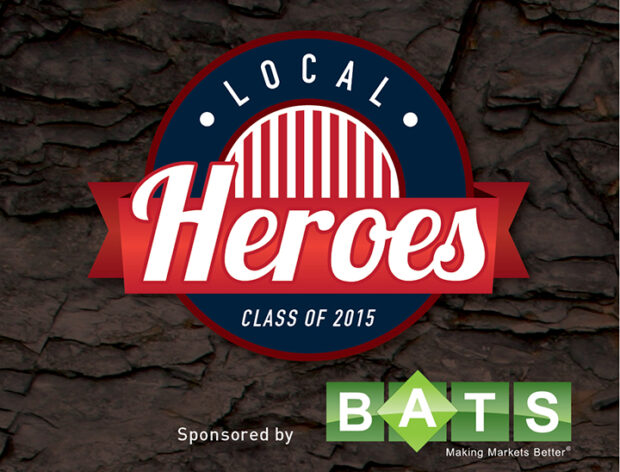
The roster of causes to serve is without limit: You can serve God. Country. Community. School. Neighbor. You can use charity and compassion to fight—against poverty, hunger, illiteracy, addiction, domestic violence or animal abuse. You can use those same tools not to fight, but to build: Supporting schools with bake sales, promoting civic awareness with a Scout troop, raising spirits with visits to the sick or the elderly.
With hope-filled actions, we can even combat hopelessness itself.
Yet far more numerous than the causes them-selves are the potential sources of these deeds. When President George Bush—the first one—invoked his vision of America as “a thousand points of light” back in 1989, he was underselling the potential of a nation numbering roughly 245 million people. Today, nearly 75 million more people can call them-selves Americans, and together, they increase that luminary output exponentially.
All it takes is the first step—to simply do. As this year’s Local Heroes have shown us.
From the varied needs of inner-city education and parochial school support, on behalf of domestic shelters or supporting centers for job training and skill attainment, from being there to take the call on a substance-abuse hot line or planting the seeds of a lifetime of service through youth voluntarism, and in many other ways, these individuals have shown us what it means to serve.
We are blessed as a community by their efforts. More important, we are blessed as individuals by the examples they have set for us. Please join us in salut-ing them, and in thanking them for their service.
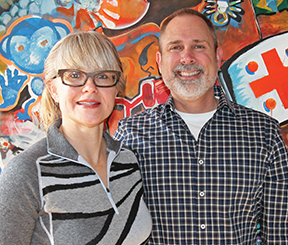
Credit this one to something we’ll call Like at First Sight. A little more than a decade ago, a group of enterprising students from the print shop at DeLaSalle Education Center sounded out Ethan Whitehill, founder of Crossroads-based advertising agency Two West, about using their services.
“The pitch impressed me, but the organization’s mission as an alternative high school moved me even more,” Whitehill remembers. “I scheduled a tour and soon after joined the board. Kids and education have been Two West’s top philanthropic priorities ever since.”
In a big way: The school says that in addition to their time and talents, Ethan and his wife, Heidi, have been major donors—contributing $10,000 or more annually—and the firm has contributed roughly $80,000 a year in-kind graphic design services for special events. The tuition-free charter high school serves students between the ages of 14 and 20 years old who need an alternative to the traditional school.
Two West has a long list of philanthropic engagements, this connection is on another level.
“Early on, I wouldn’t say we had a specific plan with DeLaSalle,” Whitehill says. “But the more we got involved, the more we were hooked. I can’t think of a more worthy cause in our community than education, or a more deserving organization than one that supports both the academic and social needs of at-risk students. If we ever want to achieve meaningful progress in this city, we have to prepare the next generation for success.”
Heidi’s passion for cinema fit precisely with one of the school’s biggest annual fund-raisers, a movie night. It didn’t take much to get her on board immediately with that cause. “Next, I became a tutor and office helper,” she said. “I also get to chaperone field trips and help with product drives.”
Tutoring, she said, was particularly rewarding. “Beyond discussion of history essays and algebra equations, many teens want someone to talk with about day-to-day situations,” Heidi says. “Seeing those students grow up and graduate has been very fulfilling.”
It was almost with a maternal sense of pride, then, that she recognized the achievements of one student in particular, Terra Harris, a senior ate DeLaSalle. Harris was chosen to wield the shears in November for the ribbon-cutting ceremony to celbrate the grand reopening of the Kansas City’s Repertory Theater’s Spencer Theatre: “Yay, Terra!” she gushed.
As president of the school’s board, Ethan says, “I had the honor of addressing DeLaSalle’s graduating seniors during commencement two years in a row. My role also meant I got to hand out diplomas. It felt amazing to shake hands with all of the young men and women. The pride in their eyes was a priceless return on my service.”
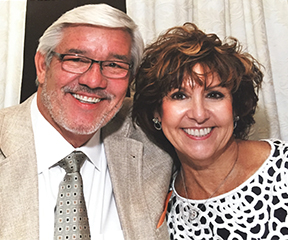
When you have seven kids to raise, you don’t need to find opportunities to serve—they come at you from all directions: from the church, from the school, from youth and faith-based organizations.
Patty and Don Kincaid know that drill well, having brought their crew up through St. Agnes parish in Mission.
The youngest of the lot is a high-school junior, and the Kincaids have seven grandchildren, but this pair still finds time to remain engaged on other levels, as well.
Two decades ago, Patty served on the committee working for the eventual restoration of Union Station, and she was co-chair for the station’s 100th birthday last year. They also work with Catholic Charities and other organizations, she says, “that are meaningful to Don and me.”
But service took on a new meaning six years ago, when their daughter Kelly started working at The Children’s Place, where she’s a child and family therapist.
“Hearing the stories and going to the different events there and seeing first-hand—some of these little kids that have been through things we shouldn’t even think about,” Patty says. “The abuse, living in foster homes, and, well, having seven of our own, they just became very dear to our hearts. We were just drawn in immediately; your heart just melts when you see them.”
Their volunteer work with the Children’s Place started with little things, Patty says, but it has definitely evolved. She’s on her third year as a board member.
Don, who has had a career in various transportation-related ventures and owned other interests, including the indoor soccer team the Kansas City Attack, is also an organizer for the annual Chiefs Charity Game, a preseason fund-raiser for The Children’s Place.
“Right now, our big involvement is to help them raise enough money so that we can either re-do the building they’re in—it’s quite old and needs work—or look toward a new building, depending on how much we can raise,” Patty said. What will that entail? “As much as we can get!” she laughs. “Our goal for this year’s Chiefs game was $600,000, and we raised $730,000. I’m laughing and saying, should we try for $900,000 next year, or go for the big million?”
Roxane Hill, director of development for The Children’s Place, said the Kincaids provided the lead gift of $100,000 for the charity game. “Not only do they donate their personal funds, but they provide the services of their companies when needed, Hill said. “The Kincaids volunteer their time, they open their home, they encourage others to believe in the mission and they want, more than all else, to improve the lives of many, many young survivors of abuse, neglect and trauma. “
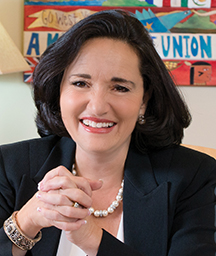
As impressive as Roshann Parris’ professional credentials are—and her resume is indeed impressive—her list of philanthropic and civic achievements on behalf of the region is just as impressive.
Her trophy case gleams with honors like the Adele Hall Spirit of Caring Award, the Kansas City Spirit Award, the Girl Scouts Pearl Award, awards hailing her as various organizations’ Woman of the Year and Public Relations Professional of the Year, Small Business Philanthropist of the Year—it’s a long list.
This month, the impact she’s had on uncountable lives in the region again came shining through when the United Way of Greater Kansas City campaign announced that the fund-raising drive she co-chaired had delivered $35.26 in donation pledges. That money will go to fund efforts to combat poverty and promote literacy, job training and community health.
A lot of people, then, stand to benefit from the hours she put into this year’s campaign. And that dovetails nicely with one of Parris’ favorite sayings: “You can’t have a perfect day without doing something for someone who can never say thank you.”
That adage, she said, “is really, truly a personal guide-post: to live every day as a perfect day by that standard. … When I had chance to talk to companies around the region for this particular campaign, and others we’ve been privileged to work on is that there’s a secret to giving back: While your hope is that the beneficiary receives support in a way that generates something very good, the secret is that it feels too darn good not to do on the giving end.”
On a professional level, she’s a nationally known communications pro who has visited more than 60 nations as part of the presidential advance team since 2009 and has worked for both the Clinton and Obama administrations, and her 3½ decades in the sector include 25 years of running her own company.
So how does Roshann Parris determine which causes merit her time and talents?
“I would like to tell you there’s this massive spreadsheet, with everything involved in a very strategic process,” Parris says. “But it’s a matter of the heart, and efforts that really speak to us.” That largely entails human services and caring for those who can’t speak for themselves—2-legged or 4-legged—such as Big Brothers & Big Sisters, Harvesters, Chldren’s Mercy Hospital and efforts to build a new animal shelter for Kansas City.
Not to be overlooked, she said, is what such engagement does for a company, as well as the soul. “One of the most invigorating parts of giving back is how meaningful it is for employees,” she said. Employees want to be part of something larger than themselves, produce good outcomes and create measureable change—“real change,” Parris says, “for one human being, one family at a time. There’s an immense gratification that comes with that ability. That becomes the inspiration for being involved in so many great organizations throughout the region.”
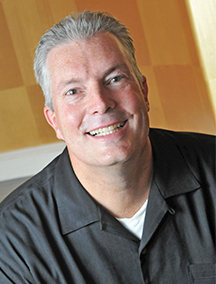
Early-morning alarm clocks and the sleep habits of ninth-graders are rarely a perfect match, and young David Battey was no exception.
But after the family joined Village Presbyterian Church, his mother had told him: Service, she said, was going to be part of the drill as part of their family’s church life. “I didn’t like the service hours,” Battey recalls with a chuckle. “Getting up early on Saturdays—I was definitely reluctant.”
But what he soon found would make a lifelong impression, set the stage for his own career, and touch the lives of thousands of young volunteers and those they would serve. “The service we did was wonderful; it changed the trajectory of my life says the founder of Youth Volunteer Corps. “We went from the church and tutored fifth-graders in Kansas City, Kan., every Saturday for a whole school year,” and the reception he would get from those young ones each week made an impact. As did the bus ride home, when students would share reflections on their experience and talk about what their work had meant to them.
A few years later, after earning his degree in political economy from Williams College in Massachusetts, where he first began to study the concept, he came back to Kansas City to explore youth volunteerism in greater details. That’s what led to the founding of YVC in 1987.
“I thought I’d go to graduate school if I got this off the ground for a couple years,” he muses, “but a couple turned into 27.” The organization he built draws in teen and youth volunteers and engages them as teams in high-quality, rewarding community-service projects.
It grew from a program operating in the summers into one that ran through the entire school year, and has since expanded to 44 cities in the U.S. and Canada, and has seen its programs expand to include students as young as middle school.
Along the way, Battey has touched the lives of more than 300,000 youth volunteers around the continent, cranking out more than 4 million total service hours. He sees the impact of that work in a lot of ways, he says, but most poignantly when he hears about what the experience has meant to volunteers and their families, sometimes long after their service has ended.
“I love getting letters and e-mail—I get a lot from parents who say ‘I can not believe my son is working so hard; he doesn’t want to take a vacation this year because he wants to volunteer,’ or ‘He won’t clean his room, but he does stuff at the Humane Society or at a nursing home.’ ”
That service, Battey says, builds self-esteem in those young minds, “and they realize there’s more to life than what’s going on at middle school or high school.”
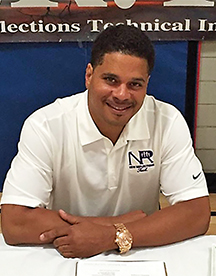
It started, says Mark Byrd, “with a thought. Just a thought, followed with action.” More than 3,000 graduates later, the instructional center he founded in 1998 continues to take at-risk residents from some of the most hard-scrabble neighborhoods in Kansas City and turn them into ready-to-hire candidates for jobs in general contracting, home building, remodeling and alterations, or certified for careers as commercial drivers, business-office administrators or accounting specialists.
It all comes down to seeing the possibilities more clearly than the current realities, Byrd says. “I had a vision in 1998 to show some kids from the neighborhood about construction trades and how much money a carpenter makes per year—$50,000 and up,” Byrd says. By comparison, the crowd out hustling on the street had virtually no long-term prospects.
Drawing on the work ethic of a third-generation contractor—Byrd owned Master Builders Construction Co. at the time—he set out on a mission to change the lives of those young men. In doing so, changed his own. “I was going from the blue-collar realm into a white-collar world,” he said. “There were a lot of people telling you what you can do or what you can’t do. But if you take need and match it with purpose, you can get things done.”
He started by taking groups of them to his construction sites in the summer, teaching the fundamentals. When fall rolled around, they were back, asking for more work. “I said, ‘Why aren’t you in school?’” Byrd recalls. The reasons for that were myriad, he learned. But there would be one common solution: education.
Nearly two decades later, New Reflections has gained accreditation from the state’s Department of Elementary and Secondary Education—something even the surrounding public school district doesn’t have—and he is expanding the curriculum to include certifications in nursing, computer repair, early childhood education, culinary arts and other lines of work. But beyond the walls of those classrooms near 75th and Troost Avenue, the social ills that spawned his initial vision remain.
So he relishes each victory, as with one young graduate who evolved from life on the street to graduation and training as a construction project manager. That young man still serves as a mentor for New Reflections, extending the string of victories to new cohorts of youths.
As giving new meaning to their lives, Byrd says, “It means the world to me. This is my life, this is what God has given me the direction and order to do. We’re saving lives through education and training.”
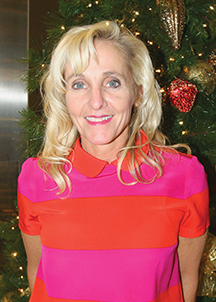
OK, so maybe it’s not quite the scale of a Pamplona, and nobody is confusing her pet project with the annual running of the bulls in Spain. But after seven years, Liz Meek and the Running with the Cows Race have made a heck of an impression on fitness buffs.
“I’m a workout freak,” says Meek, “and our little Catholic school at 223rd and Metcalf struggles to make ends meet—it’s a small country school, there are not a lot of kids in each class.”
“I always wanted to do a race out there; it’s just gorgeous, with the fields, and farms and the cows,” Meek said. “So I thought it would be a great way to make money for the school.”
Putting those two interests together created a spark that has not only helped officials at Queen of the Holy Rosary School improve its financial position, it has strengthened the connections between people living near the northern Miami County community and put the area on the map of distance races in the state.
In its first year, the race, with a 5-kilometer version and a half-marathon for the more adventurous, drew somewhere around 500 runners, she said, but the 2015 installment had more than 3,000. It has lured runners to Queen of the Holy Rosary School’s grounds in northern Miami County from across the country and as far away New Zealand and England.
But beyond raising funds to support the parochial school, she and her team organizing the event have created a new sense of community in that exurban region.”
One of the sheriff’s officers said the crowd was 5,000 to 6,000 at the school, including runners, people bringing in food, and families, she said. At that level, the race puts the tiny town of Wea in contention, at least for a day, as the largest community in the county, rivaling the county seat of Paola. And at one point, Running with the Cows was ranked as the second-largest half-marathon in Kansas.
But the race is about far more than fitness. “It’s such a group effort for that whole community,” Meek says. “There’s not one person who’s a hero; the whole community is.” And they dine like a community as part of the festivities.
“There are just crazy amounts of foods,” Meek said. “We wanted to have people feel like our guests at Holy Rosary, and our post-race food is off the charts. It’s like a church buffet, with a lot of home-cooked foods, and a lot of food that’s donated. It’s just amazing.
“I don’t know if we’re changing the world, but in our community, it’s not just about the pot of money, it’s that we have a bond now. People who haven’t met are becoming best friends. … It’s a most amazing thing to see.”
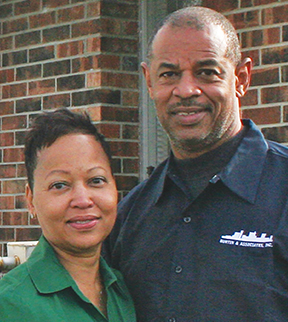
Doing good as a function of business is a family concern for Eric and Burnetta Burtin, one with a deeply personal tie to their building-services company. For nearly a decade, Eric has been involved with First Call, a substance-abuse hotline. It has a mission that is woven directly into the lives of many they employ—people from tough backgrounds who have made some unfortunate choices, paid the consequences—they’re trying to rejoin the working world.
The Burtins serve as mentors with various organizations, one of which is the Urban Rangers, which Burnetta says provides a no-sugar-coating approach to young people regarding education and keeping their lives on track. In addition, they’re involved with St. Monica’s Catholic Church, the DeLaSalle Education Center and the Healing Pathway Victim Service Agency in partnership with the KCMO Police Department, to name but a few.
The Burtins serve as mentors with the Urban Rangers, which Burnetta says provides a no-sugar-coating message about the need to maintain the progress they’ve made getting their lives on track. They’re involved with St. Monica’s Catholic Church and support the DeLaSalle Education Center with in-kind contributions and support from their employees.
Eric’s role with First Call began with an invitation to be part of that non-profit’s annual fund-raising golf tournament a decade ago. “Because of the programs we have for our employees, we thought it would be good idea to get more involved,” he says, crediting his wife—the company’s CEO—for shouldering the office load that allowed him to take on extra duties with the tournament. “The issues that our employees, have, we refer a number of them to First Call, and we donate billboard space and other items so First Call can help them out when they ask.
Through 2014, he also has served a four-year term on the board for the Mountain Plains Minority Supplier Development Council, which facilitates links between minority businesses and major buyers, like corporations and government entities.
The call to serve, Eric said, is a deeply rooted one for him. “I grew up in a family of seven, four girls and three boys,” he says. “My dad died when I was young, my mother was disabled and people helped us. I just wanted to help other people. We started this business to help people that most others wouldn’t employ.”
That makes the alliance with First Call a natural fit, he says. For those who make mistakes, many don’t provide a second chance.”
The payoff, he said, is a deeply personal satisfaction of seeing young people learn job skills and in many cases, move on to bigger and better things, working for far larger companies like Ford, Johnson Controls or the Federal Aviation Administration.
“If we can see one person, where we’ve made a difference in their life, we’re happy,” Eric says. “It’s important, because if they can get back on their feet, they can take care of themselves,
their families and become productive people in the community.”